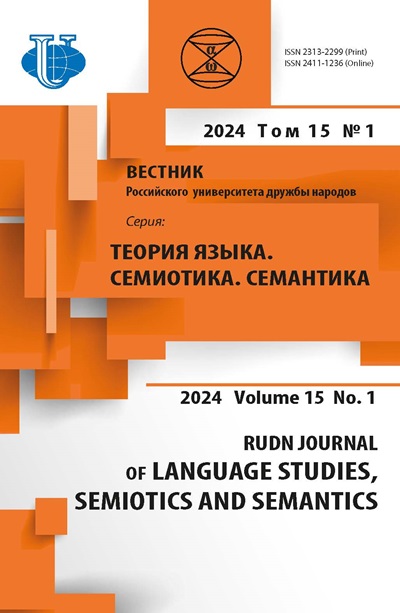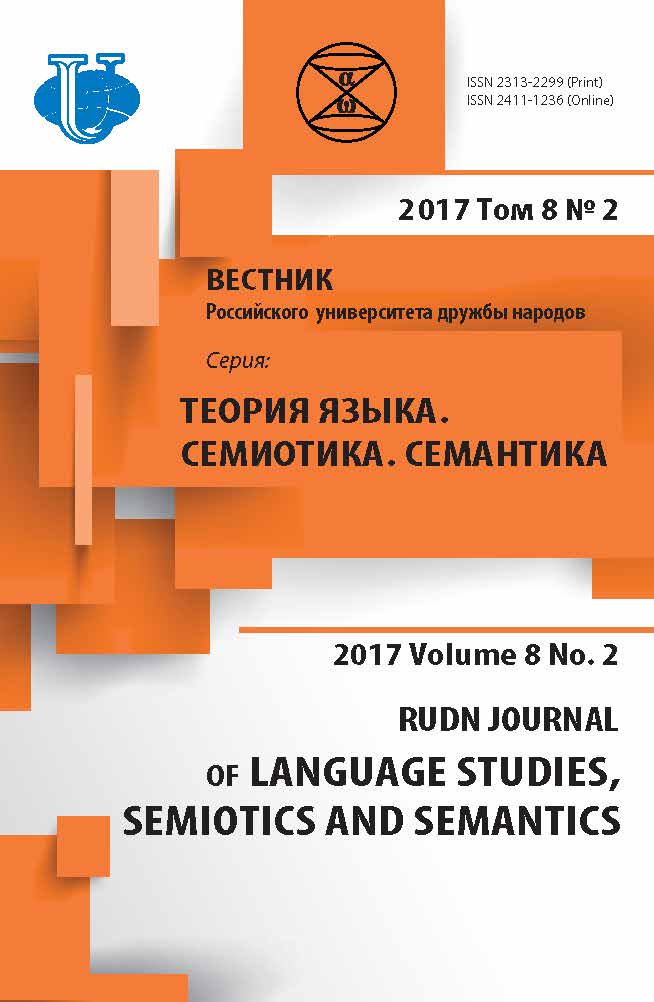“Trojan Cycle” as Source of Precedence in the Mass Media Discourse
- Authors: Segal N.A.1, Mischenko A.N.1
-
Affiliations:
- V.I. Vernadsky Crimean Federal University Tauride Academy
- Issue: Vol 8, No 2 (2017)
- Pages: 367-376
- Section: Articles
- URL: https://journals.rudn.ru/semiotics-semantics/article/view/16346
- DOI: https://doi.org/10.22363/2313-2299-2017-8-2-367-376
Cite item
Full Text
Abstract
Mechanisms of linguistic representation of preceding constructions with origin sphere «Trojan War» are questioned in the article, specifics of its operation in mass-media discourse are identified. To describe the communicative-pragmatic content of political text in this research thematic, semantic and grammar classification of constructions, which were proposed, taking into consideration replaced core component and pragmatic attitudes of recipient. The article states that change of semantic structure is not only to denotative level, but also connotative and pragmatic level, where preceding phenomena «Trojan cycle» acquires new semantic features. Particular properties analysis of preceding constructions with origin sphere «Trojan War» allows to come to a conclusion about the fragment specification of world’s picture, fastened in preceding phenomenon of mythological type.
About the authors
Natalia Alexandrovna Segal
V.I. Vernadsky Crimean Federal University Tauride Academy
Author for correspondence.
Email: natasha-segal@mail.ru
Vernadsky Avenue, 4, Republic of Crimea, Simferopol, Russia, 295007
Anna Nikolaevna Mischenko
V.I. Vernadsky Crimean Federal University Tauride Academy
Email: anutik-anutik18@mail.ru
Vernadsky Avenue, 4, Republic of Crimea, Simferopol, Russia, 295007
References
- Bahi, A.M. (2013). The political phraseology of the Arabic language. Scientific Notes of Taurida V.I. Vernadsky National University. Series Philology. Social Communications, 2, 26 (65), 183—188. (in Russ).
- Drjangina, E.A. (2011). Features precedent texts as a means of associative-shaped representation of linguistic identity. Yaroslavl Pedagogical Bulletin, 2, 165—174. (in Russ).
- Dubrovina, K.N. (2005). Linguistic principles of stylistic devices usage of phraseological units (fiction and journalist texts). Bulletin of Peoples’ Friendship University of Russia. Series Linguistics, 7, 100—117. (in Russ).
- Klushina, N.I. (1995). Impact of the value dichotomy of «his»/«foreign» into the language of contemporary newspaper. In: Journalism in 1994: Abstracts of the scientific and practical conference. Part 4. Moscow: Moscow State University. p. 11—21. (in Russ).
- Krosh, M. (1894). The Concise Dictionary of mythology and antiquities. St. Petersburg: A.S. Suvorin. (in Russ).
- Myths of Ancient Greece: Glossary Directory. (2009). URL: http://my-dict.ru/dic/enciklopediya-mifologii/2173839-troyanskiy-kon (accessed: 02.09.2016).
- Ozhegov, S.I. (2008). Dictionary of Russian language. Moscow: Onyx. (in Russ).
- Telija, V.N. (1988). Metaphor and its role in the linguistic picture of the world. Moscow. p. 173—203. (in Russ).
- Telija, V.N. (1996). Russian phraseology: semantic, pragmatic and cultural linguistics aspects. Moscow: Languages of Russian culture. (in Russ).
- Fedorov, A.I. (2008). Phraseological dictionary Russian literary language. Moscow: Astrel. (in Russ).













